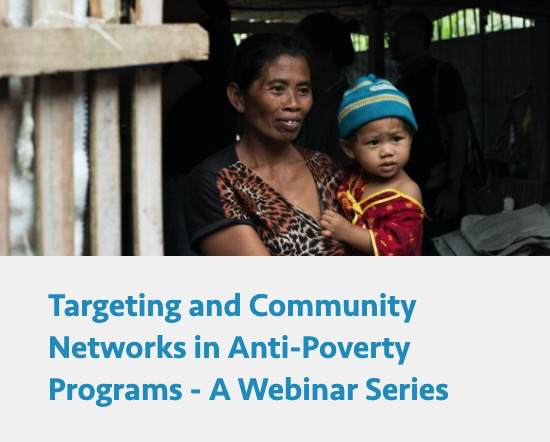Targeting credit through community members
SHARE THIS

| Diego Vera-Cossio (IADB) | |
| Tuesday 15 December 2020 at 9:30 am (Hong Kong time, GMT +8) | |
|
Zoom (Click here to register) Facebook Live |
[Update 2020.12.15] Our apologies that due to a technical issue the webinar was not livestreamed to our Facebook page as originally planned.
Community-based lending programs may reduce distortions in credit markets by exploiting information transmitted in local networks, but connections may create asymmetries in power. This paper analyzes how local leaders balance issues of neediness, productivity, risk, and favoritism to allocate subsidized loans to Thai villagers. Local leaders provided credit to richer, less-productive and elite-connected villagers threatening the program’s sustainability. Informal markets partially attenuated the targeting distortions by redirecting credit from connected to unconnected households, albeit at high interest rates. Eliminating the connection-based distortions would reduce within-village inequality by 10% and increase village-level output by 0.8% to 2.4%.
About the speaker
Diego Vera-Cossio is an economist in the Research Department of the Inter-American Development Bank. His area of interest is development economics. In particular, his research analyzes how different policies help or prevent family businesses from growing in contexts in which access to finance is limited. He is also interested in understanding how different methods of targeting and delivering resources from public programs affect policy effectiveness. Diego, a citizen of Bolivia, received his Ph.D. in Economics from the University of California, San Diego in 2018. He holds a Masters Degree in Economics from Universidad de Chile and a Bachelor’s Degree in Economics from Universidad Católica Boliviana. Visit his personal website >>
To Attend the Event
The speaker will present for 1 hour and 15 minutes, and will take questions during the presentation.
The event will be held online via Zoom. ***** Register HERE ******
Zoom will send you a confirmation email right away upon registration with a unique link to join the webinar. Reminder emails will also be sent 1 day and again 1 hour in advance of the event. Please check your spam box if you cannot find them in the inbox.
As part of our security measures, the webinar room will be locked about 20 minutes after the webinar starts.
Also, see here for advice from the university's IT office on Zoom best practices for attendees.
This webinar is part of a series of webinars to present cutting-edge research on Targeting and Community Networks in Anti-Poverty Programs
Get updates from HKUST IEMS








